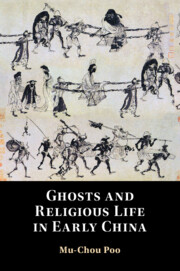Book contents
- Ghosts and Religious Life in Early China
- Ghosts and Religious Life in Early China
- Copyright page
- Contents
- Preface
- 1 Ghosts
- 2 The Emergence of Ghosts in Early China
- 3 Imperial Order and Local Variations
- 4 Stories That Reveal the Dark Corner
- 5 Ghosts in Early Daoist Culture
- 6 The Taming of Ghosts in Early Chinese Buddhism
- 7 Chinese Ghosts in Comparative Perspective
- Bibliography
- Index
7 - Chinese Ghosts in Comparative Perspective
Published online by Cambridge University Press: 13 January 2022
- Ghosts and Religious Life in Early China
- Ghosts and Religious Life in Early China
- Copyright page
- Contents
- Preface
- 1 Ghosts
- 2 The Emergence of Ghosts in Early China
- 3 Imperial Order and Local Variations
- 4 Stories That Reveal the Dark Corner
- 5 Ghosts in Early Daoist Culture
- 6 The Taming of Ghosts in Early Chinese Buddhism
- 7 Chinese Ghosts in Comparative Perspective
- Bibliography
- Index
Summary
As has been discussed in Chapter 1, we consider ghosts as cultural constructions, yet they also helped to construct the cultural landscape that they belonged to. Although ghosts have an imaginary existence, the world would not be complete without them. Some of the most important messages and most profound reflections about life are done with the agency of ghosts. The descriptions about the nature and behavior of ghosts, whether in literary texts or in religious documents, help us to trace and identify these messages and reflections. These reflections could be understood as comments on ethical or moral values, or the fairness of justice. They could also express specific personal grievances or general remarks on worldly affairs, and they often could not avoid the themes of the love of life or the meaning of death. Although these reflections may be generally found in and are applicable to many cultures, their specific contexts dictate how they were formulated. Each culture therefore constructs its own types of ghost according to its predilections. By studying these, and comparing one with the others, it is possible to dig deeper into the cultural psychology and gain some understanding of certain aspects of the uniqueness of each culture, and, moreover, through the identification of shared values, to appreciate this uniqueness within the context of a common humanity.
- Type
- Chapter
- Information
- Ghosts and Religious Life in Early China , pp. 170 - 189Publisher: Cambridge University PressPrint publication year: 2022



